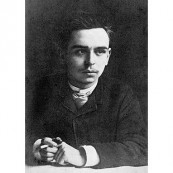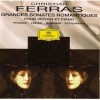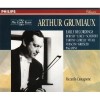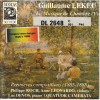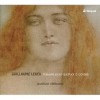| Country: | Belgium |
| Period: | Romantique |
Biography
Jean Joseph Nicolas Guillaume Lekeu (20 January 1870 – 21 January 1894) was a Belgian composer of classical music.
Lekeu was born in Heusy, a village near Verviers, Belgium.[1] He received his first lessons in piano and music theory from Alphonse Voss, then director of the brass band at the local conservatory. In 1879, his parents moved to Poitiers, France.[1] There he was introduced to the music of Beethoven and Bach by his physics teacher Alexandre Tissier, an amateur musician. He continued to pursue his music studies independently while at school, composing his first piece at the age of 15.[1] From 1885 he regularly composed new music,[2] especially for piano, and studied harmony and violin from 1887 under Octave Grisard.
In June 1888, his family settled in Paris and he began to study in philosophy.[3] He was introduced to the works of Téodor de Wyzewa and continued his studies under Gaston Vallin. In August 1889, he traveled to Bayreuth to see Wagner's music dramas. On his return, he studied counterpoint and fugue privately with Cesar Franck.[2] Franck encouraged him to continue composing, and they became good friends. After Franck's death in the autumn of 1890, Wyzewa introduced him to Vincent d'Indy, who taught him orchestration and encouraged him to compete for the Prix de Rome awarded in Brussels.[1] In 1891, he won second prize in the Belgian Prix de Rome for his cantata Andromède.[2]
In 1892 d'Indy introduced Lekeu to Octave Maus, then secretary of the Le Cercle des XX.[2] There he conducted his several works and met the eminent violin virtuoso Eugène Ysaÿe, who commissioned a violin sonata from him[1] which premièred in March 1893. The sonata was considered a worthy successor to the compositions of Franck and Fauré, both in A major. Lekeu's G major sonata is still considered his masterpiece.
Having contracted typhoid fever from a contaminated sorbet in October 1893[4] he died in his parents' home in Angers, on 21 January 1894, the day after his 24th birthday. On 26 January 1984, Guillaume Lekeu was buried in a small cemetery in his home town of Heusy.
Lekeu's personal style was presented in his earliest compositions. In 1887, he said "Bien plus, ce sera bizarre, détraqué, horrible, tout ce qu'on voudra; mais, du moins, ce sera original" [4] (Even more, it will be weird, crazy, horrible, anything you like, but, at least, it will be original). Beethoven provided the inspiration for the composition of Lekeu's string quartets, and Bayreuth influenced his approaches to melody. He called this style as "des mélodies de telle longeur qu'un seul exposé suffisait à parfaire ... un morceau de musique" [4] (melodies of such length that a single presentation was sufficient to complete ... a piece of music). Nonetheless, his primary influence was Franck. Lekeu also wrote less sombre works, but many are characterized by a certain melancholy. As he wrote, "la joie [est] mille fois plus difficile à peindre que la souffrance"[4] (joy is a thousand times harder to paint than suffering). Although Lekeu died at a young age, at a time when his compositional skills were not yet perfected, his music displays a remarkable maturity.





